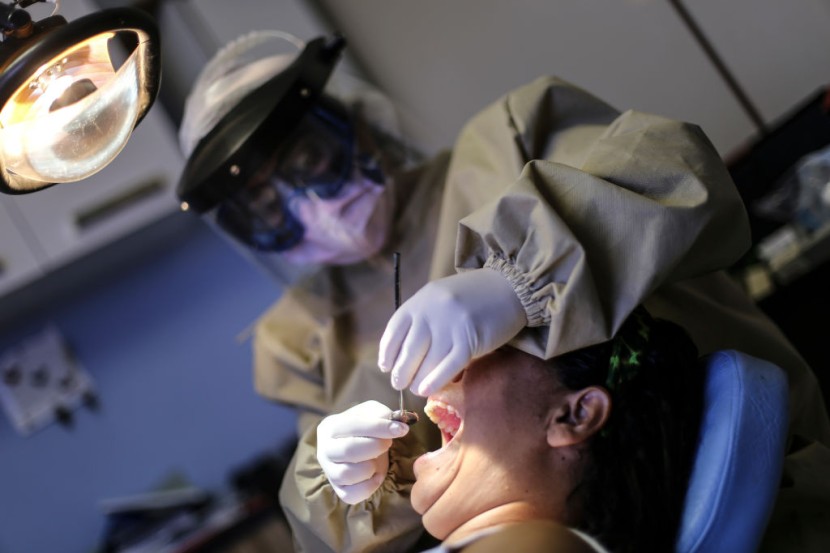COVID-19 could enter people's lungs via saliva, with the virus passing directly from mouth to bloodstream, especially if they have gum disease, new research reveals. Evidence suggests that COVID-19 lung disease impacts blood vessels first, rather than airways, with elevated virus concentrations in saliva and periodontitis linked to an increased risk of death.
Oral hygiene could prevent severe COVID-19 infection

According to the researchers, dental plaque accumulation and periodontal inflammation increase the risk of the SARS-CoV-2 virus affecting the lungs and causing more severe infections. Experts said this finding could make good oral healthcare a potential life-saving action, advising the public to take quick but effective, regular precautions to maintain oral hygiene and eliminate causes contributing to gum disease, such as plaque buildup.
The results were published in the Journal of Oral Medicine and Dental Research by an international team of researchers from the United Kingdom, South Africa, and the United States. They point to new evidence that some ingredients in specific inexpensive, readily available mouthwashes are highly effective in preventing severe COVID-19.
Simple oral hygiene measures, such as the use of these particular mouthwash products, can help reduce the risk of COVID-19 virus transmission from the mouth to the lungs and help avoid serious infections, as per Medical Xpress.
Dr. Graham Lloyd-Jones, a radiologist, observed lung CT scans from COVID-19 lung disease patients, which led to a collaboration between medical and dental experts on the possible entry route into the bloodstream.
"This model will help us understand why certain individuals experience COVID-19 lung disease and others do not," said co-author Iain Chapple, Professor of Periodontology at the University of Birmingham. It may also improve how we deal with the infection, encouraging us to look at low-cost or even free drugs aimed at the mouth and, hopefully, saving lives.
US Halts Use of Johnson & Johnson COVID-19 Vaccine Following Rare, Severe Blood Clots
"Gum disease causes the gums to leak, allowing bacteria to reach the bloodstream. Simple treatments, such as careful toothbrushing and interdental cleaning to minimize plaque build-up, as well as specific mouthwashes or saltwater rinsing to reduce gingival inflammation, may help lower the virus's concentration in saliva, reducing the risk of lung disease and worsening to extreme COVID-19."
Experts from Salisbury District Hospital in the U.K., the University of Birmingham, and the Mouth-Body Research Institute in California, Los Angeles, and Cape Town, South Africa, made up the research team.
Their new finding is that the mouth serves as a testing ground for the virus, with every break of oral immune defenses allowing the virus to penetrate the bloodstream more quickly. The coronavirus would travel from blood vessels in the gums to the heart through neck and chest veins, where it would be pumped into pulmonary arteries and small vessels in the lung base and periphery.
Why Brazil's COVID-19 Deaths Terrifyingly Increase Among Babies, Children
Gum disease increases the chance of catching COVID-19
According to The Sun, there are some ways to determine whether you are at risk for gum disease. Gum disease can be avoided in most cases by practicing proper oral hygiene, but the older you become, the more vulnerable you get.
People with diabetes are more likely to develop gum disease due to their fluctuating blood sugar levels. Any treatments trigger dry mouth, which prevents bacteria on your gums from being washed away.
Gum disease can also be exacerbated by more serious illnesses like HIV or cancer. Smoking is a significant risk factor for gum disease, and once you drink, it will also conflict with the effectiveness of gum disease care.
Many of the risk factors for severe COVID-19 and gum disease are the same, according to Los Angeles-based dental expert Dr. Lloyd-Jones, who also worked on the paper.
In February, it was discovered that COVID-19 patients with gum disease are nine times more likely than people without the condition to die from the virus. Patients with gum disease were also 4.5 times more likely to need a ventilator, according to the report. People with the oral condition are 3.5 times more likely to be referred to intensive care, said the study conducted in the Journal of Clinical Periodontology.
People Who Had Common Cold Could be Protected Against COVID-19 Study Suggests








